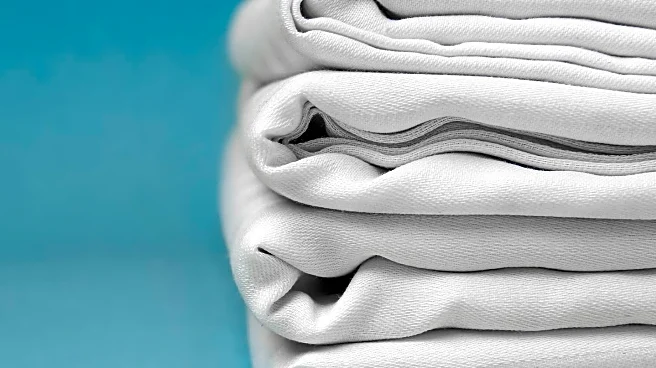What's Happening?
CNET has published guidelines on the frequency of washing bed sheets, emphasizing the importance of regular cleaning for hygiene and comfort. The article suggests washing sheets every week or at least every other week to prevent the accumulation of sweat, dust mites, skin cells, and body oils. These elements can create an uncomfortable and potentially unhealthy sleeping environment. The advice is particularly relevant for individuals with allergies, asthma, sensitive skin, or those who sleep with pets. The article also provides tips on the best methods for machine-washing sheets, including separating by color and checking for stains before washing.
Why It's Important?
Regularly washing bed sheets is crucial for maintaining a healthy sleep environment, which can impact overall well-being. Clean sheets can help prevent skin irritations and allergic reactions, contributing to better sleep quality. The advice from CNET highlights the importance of hygiene in everyday life, particularly in personal spaces like the bedroom. This information is valuable for consumers seeking to improve their sleep hygiene and for businesses in the home goods industry, as it may influence purchasing decisions related to bedding products and laundry supplies.
What's Next?
As awareness of the importance of sleep hygiene grows, consumers may increasingly seek products that facilitate easier and more effective cleaning of bedding. This trend could lead to innovations in laundry detergents and washing machines designed specifically for bedding. Additionally, there may be a rise in demand for bedding materials that are easier to clean and maintain. Companies in the home goods sector might explore opportunities to educate consumers on best practices for maintaining a clean sleep environment, potentially influencing product development and marketing strategies.
Beyond the Headlines
The emphasis on frequent sheet washing reflects broader societal concerns about cleanliness and health, particularly in the wake of heightened awareness due to the pandemic. This focus on hygiene may extend to other areas of home care, encouraging consumers to adopt more rigorous cleaning routines. The advice also touches on cultural habits related to sleep and personal care, potentially influencing lifestyle choices and consumer behavior. As people become more conscious of the impact of their environment on health, there may be a shift towards prioritizing cleanliness and comfort in all aspects of daily life.









